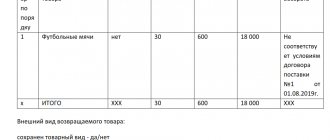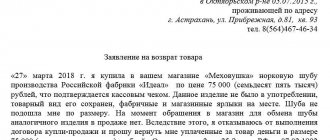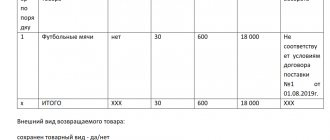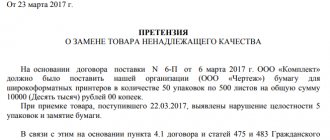Returning goods of inadequate quality: instructions for consumers
Last year, on World Consumer Day, we published a lot of material about the consumer, his status and rights. There we touched on a number of reference points in this large topic, so we recommend reading it if you haven’t already.
And today we will consider in detail one of the aspects of consumer rights protection, which in practice most often leads to a conflict of interests between the buyer and the seller. We are talking about the consumer's right to return or replace goods of inadequate quality.
What to do if a low-quality product is sold? How does the right to replace goods of inadequate quality differ from the consumer’s right to exchange goods? Is every product subject to return, replacement or exchange?
About this in our material.
1. Legislative basis for the right to replace goods of inadequate quality.
Let us recall that the main document in this area is the Law of February 7, 1992 No. 2300-1 “On the Protection of Consumer Rights”. This is one of the old-timers of Russian legislation; it has been in effect for almost 20 years and is still relevant, although it undergoes periodic adjustments.
The right to return, or more precisely, to replace a product, as a consumer’s right when defects are discovered in a product, appears in two options (Part 1 of Article 18 of the Law):
- or as a requirement to replace it with a product of the same brand (same model and (or) article),
- or as a requirement to replace it with the same product of another brand (model, article) with a corresponding recalculation of the purchase price.
Since it is the buyer’s (consumer’s) right to demand replacement of goods of inadequate quality, the seller (or manufacturer, importer) has the obligation to replace such goods within 7 days from the date of presentation of the specified demand. If it is necessary to carry out additional checks on the quality of the goods, the replacement period is extended to 20 days, and in the event that the goods required for replacement are not available, the replacement must be carried out within a month from the date the buyer submits the request.
This is an imperative rule, established by Article 21 of the Law on the Protection of Consumer Rights, so if the seller tries to deny you the right to return a defective product, you can safely refer to the law.
A small note: such claims are made during the warranty period or shelf life of the product. This is a general rule. More details about the nuances regarding the calculation of the deadlines for submitting claims by the consumer regarding product defects can be found in Article 19 of the Law on the Protection of Consumer Rights.
We also note that instead of a replacement in the event of a sale of a product of inadequate quality, the buyer has the right, at his choice, to demand one of two:
1) free elimination of defects in the goods or reimbursement of expenses for correcting defects by the consumer or a third party. We are talking about repairing the item at the expense of the seller. The buyer does not bear any additional costs;
2) a proportionate reduction in the purchase price. In this option, the seller and buyer usually negotiate a discount. As practice shows, consensus is easily achieved if a purchase is made on the market.
But this story is not about returning goods. Just keep in mind that this is also possible.
2. The right to replace the product: a wagon of possibilities and a small cart of limitations.
First case. There is an interesting rule that few people know about and which is rarely applied. In all cases when it takes more than seven days to replace a product, at the request of the consumer, the seller, within three days from the date of presentation of the request for replacement, is obliged to provide the consumer for temporary use for the period of replacement, free of charge, with the same basic consumer properties, ensuring it delivery at your own expense. This is the provision of the fourth paragraph of Part 1 of Article 21 of the Law on the Protection of Consumer Rights.
Naturally, the rule applies only to non-food durable goods. However: you purchased, for example, a smartphone, but it works every now and then. You want to replace it, but there is no such model in stock. While it is being brought in for replacement, you can fully count on being provided with a smartphone of another model or brand with the most authentic characteristics for you to “use.” Interesting opportunity? Of course, although it is difficult to imagine this in reality, but, as they say, the law says.
It is important to know about the exceptions to this rule. At the end of last year, Decree of the Government of the Russian Federation dated December 31, 2021 No. 2463 approved the List of durable goods that are not subject to the consumer’s requirement to provide him with free goods that have the same basic consumer properties for the period of repair or replacement of such goods. This list includes:
1. Cars, motorcycles and other types of motor vehicles, trailers for them, numbered units (engine, engine cylinder block, chassis (frame), body (cabin) of a motor vehicle or self-propelled vehicle, as well as a gearbox and axle of a self-propelled vehicle) for automobiles, motorcycles and other types of motor vehicles, except for goods intended for use by disabled people, pleasure craft and watercraft.
2. Furniture.
3. Electrical household appliances used as toiletries and for medical purposes (electric shavers, electric hair dryers, electric hair curling irons, medical electric reflectors, electric heating pads, electric bandages, electric blankets, electric blankets, electric hair dryer brushes, electric hair curlers, electric toothbrushes, electric hair clippers and other devices that come into contact with mucous membranes and (or) skin).
4. Electric, gas and gas-electric household appliances used for heat treatment of products and cooking.
5. Civilian weapons, main parts of civilian firearms, cartridges for civilian weapons, as well as initiating and flammable substances and materials for self-loading cartridges for civilian long-barreled firearms.
6. Jewelry and other products made of precious metals and (or) precious stones, cut precious stones.
So our hypothetical “smartphone rule” doesn’t always work. But the list is closed, but did you notice that computer equipment and other gadgets are not on it? Same thing. Go for it!
Second case. As we noted at the very beginning of the article, the consumer has two options regarding a product of inadequate quality in the context of its replacement. And the second presupposes the right to demand replacement with the same product of another brand (model, article) with a corresponding recalculation of the purchase price. In this case, Article 24 of the Consumer Rights Protection Law establishes the rules:
1. If the price of the goods to be replaced is lower than the price of the goods provided in exchange, the consumer must pay the difference in prices.
2. If the price of the goods to be replaced is higher than the price of the goods provided in exchange, the difference in prices is paid to the consumer.
Logical. No questions arise when prices are determined at the time the goods are replaced. But it happens that it is not possible to convince the seller and you have to go to court. Here the prices of the goods being replaced and those transferred in exchange will be determined at the time the court makes a decision to replace the goods.
More nuances in favor of the consumer. A product of inadequate quality can only be replaced with a new product, that is, with a product that has not been used, and the warranty period in case of replacement will begin again from the day the new product is handed over to the consumer.
And let us remind you that the consumer’s absence of a cash or sales receipt or other document certifying the fact and conditions of purchase of the goods is not grounds for refusal to satisfy his requirements (Part 5 of Article 18 of the Law on the Protection of Consumer Rights). We agree that in practice it is better to present a receipt; this will greatly simplify the already not very pleasant procedure of submitting claims to the seller. However, a check is not required.
3. Replacement and exchange are two big differences.
If the replacement of a product refers to situations where a product is sold of inadequate quality, then the exchange of goods is, one might say, a legal whim of the buyer in relation to a quality product that simply did not fit.
Article 25 of the Law guarantees the consumer the right to exchange a product of normal quality for a similar one in the event that the product does not fit in shape, dimensions, style, color, size or configuration.
Such exchanges can be made within 14 days, not counting the day of purchase. If the seller does not have the goods necessary for exchange, the buyer has the right to return the purchased goods to the seller and receive the money paid for it. An exchange of goods of proper quality is carried out if it has not been used, its presentation, consumer properties, seals, factory labels, packaging, as well as a sales or cash receipt are preserved.
Please note that in case of exchange (since this is a “legal whim”) a receipt is required. Although its absence does not deprive the consumer of the opportunity to refer to witness testimony proving the fact of purchase. And, of course, the consumer’s right to exchange does not apply to food products.
As with any general rule, there are exceptions here. The Government Resolution mentioned last year also approved a list of non-food products of adequate quality that are not subject to exchange. It is almost identical to the list that has existed since 1998, and includes:
1. Products for the prevention and treatment of diseases at home (sanitary and hygiene items made of metal, rubber, textiles and other materials, medical products, oral hygiene products, spectacle lenses, child care items), medicines.
2. Personal hygiene items (toothbrushes, combs, hairpins, hair curlers, wigs, hairpieces and other similar products).
3. Perfume and cosmetic products.
4. Textile goods (cotton, linen, silk, wool and synthetic fabrics, goods made from non-woven materials such as fabrics - ribbons, braid, lace, etc.), cable products (wires, cords, cables), construction and finishing materials (linoleum, film, carpeting, etc.) and other goods, the price of which is determined per unit of length.
5. Sewing and knitted products (sewing and knitted linen products, hosiery products).
6. Products and materials made entirely or partially from polymeric materials and in contact with food products (tableware and kitchen utensils, containers and packaging materials for storing and transporting food products, including for one-time use).
7. Household chemicals, pesticides and agrochemicals.
8. Furniture sets for household use.
9. Jewelry and other products made of precious metals and (or) precious stones, cut precious stones.
10. Cars and motor-bicycle products, trailers for them, numbered units (engine, engine cylinder block, chassis (frame), body (cabin) of a motor vehicle or self-propelled machine, as well as the gearbox and axle of a self-propelled vehicle) for cars and motor-bicycle goods, mobile vehicles small-scale mechanization of agricultural work, pleasure boats and other household watercraft.
11. Technically complex household goods with a warranty period of at least one year.
12. Civilian weapons, main parts of civilian firearms, cartridges for civilian weapons, as well as initiating and flammable substances and materials for self-loading cartridges for civilian long-barreled firearms.
13. Animals and plants.
14. Non-periodical publications (books, brochures, albums, cartographic and musical publications, sheet art publications, calendars, booklets, publications reproduced on technical media).
We deliberately did not cover the issue of replacing food products, for example, low-quality food products, so that you would want to return to the beginning of this article and follow the link to a large material on the topic of consumer rights. It's about this and more. As Yuri Grymov said, “Come, it will be interesting.”
Victoria Burla
For
May 5, 2021
Within what time frame must the service provider satisfy the requirement to eliminate deficiencies?
In order to fulfill the reasonable requirements of the consumer and eliminate the shortcomings of the results of his work, the contractor is assigned:
- 14 days is the standard period regulated by law;
- More or less time - if this is stipulated in a written agreement between the provider and the recipient of the service. In this case, the period for eliminating deficiencies specified in the agreement cannot be more than 45 days.
Please note that the contractor can proportionately reduce the cost of the service provided within 10 days after receiving the relevant claim. Within the same period, the agreement between the parties to the transaction may be terminated, and compensation must be provided for the costs of eliminating shortcomings in the work performed, free production of a similar item of proper quality, or urgent re-provision of the service.
The service provider violated the specified regulated deadlines; for each day of delay, he will have to pay the consumer a penalty in the amount of 3% of the cost of the poor-quality work performed. The penalty can be collected peacefully or through court. In both cases, we recommend that you obtain prior legal advice.
Arbitrage practice
The Law “On the Protection of Consumer Rights” provides the buyer with a number of rules necessary to protect their interests and put unscrupulous manufacturers or entrepreneurs negligent in their duties at a disadvantage. What is evidenced by numerous judicial practices in cases of consumer rights protection.
So, for example, by the decision of the Leninsky District Court of Smolensk dated December 18, 2021 in case No. 2-2320/19, due to several breakdowns of the phone during the warranty period and repeated troubleshooting for a total of 76 days, the purchase and sale agreement for the smartphone was terminated .
91,990 rubles were recovered from Svyaznoy Network LLC in favor of K. A. Mamanovich. to return the cost of the phone, RUB 39,344. 81 kop. penalties, 1000 rub. for compensation for moral damage and 15,000 rubles. fine
Dear readers! To solve your problem right now, get a free consultation
— contact the lawyer on duty in the online chat on the right or call: +7 (499) 938 6124 — Moscow and region.
+7 (812) 425 6761 — St. Petersburg and region. 8 (800) 350 8362 - Other regions of the Russian Federation You will not need to waste your time and nerves - an experienced lawyer will solve all your problems! Or describe the situation in the form below:
How to calculate the warranty repair period
In order to correctly determine whether the 45-day warranty repair period has been violated, it should be calculated correctly, that is, you need to understand from what day the warranty repair period is calculated.
This period begins to flow from the day following the day the consumer contacts the seller (manufacturer) with a request for warranty repairs, and ends on the day the consumer receives the repaired product from the service center.
The warranty repair period for the product cannot be suspended or interrupted . The repair period cannot be affected by such circumstances as checking the quality of the product by the seller or conducting an examination to determine the causes of its malfunction.
Under any circumstances, the seller (manufacturer) assumes the consequences of violating the warranty period for repairing the product, since they are obliged to correctly calculate the time required to carry out a quality check of the product or examination, and if as a result a warranty case is established, then the time for warranty repairs , and with all this within 45 days.
What products cannot be sold remotely?
Not all products can be sold remotely. For example, free sale is prohibited:
- alcoholic products;
- food products;
- jewelry;
- medicines;
- audiovisual products;
- food products (except for ice cream, soft drinks and beer, confectionery and bakery products);
- and some other goods, the free sale of which is limited by the legislation of the Russian Federation.
It’s worth making a reservation here - these are the rules for the sale of certain types of goods, approved by Decree of the Government of the Russian Federation of January 19, 1998 No. 55 regarding the requirements for entities engaged in retail trade outside of a retail facility. And this list is given there. However, this list itself is very, very controversial. Let me explain why. Personally, for me, this list relates more to retail trading rather than remote trading. But there is a letter from Rospotrebnadzor, according to which this prohibited list also applies to online stores (letter dated 04/08/2005 No. 0100/2569-05-32). This opinion is indirectly confirmed by judicial practice (determination of the St. Petersburg City Court dated September 12, 2011 No. 33-13810/2011). Therefore, the list is for general understanding.
There are rules for distance trading - Decree of the Government of the Russian Federation dated September 27, 2007 No. 612, they have their own rules about what is not allowed to be sold in this way (clause 5). And it is described very, very vaguely: “Remote sales of alcoholic beverages, as well as goods, the free sale of which is prohibited or limited by the legislation of the Russian Federation,” are not allowed.”
Rule 8. Not all products can be sold remotely
Please do your research before placing items on the site for sale.
However, even for such cases, online stores place goods on the website to familiarize themselves with the product, the opportunity to reserve it and buy it in an offline store:
About independent examination
It happens that the contractor refuses to eliminate the shortcomings, arguing that he provided high-quality services. But the results of the work turned out to be poor and/or defects arose subsequently due to the fault of the consumer. In such cases, it is worth conducting an independent examination.
Please note: only an independent specialist who has a valid license to carry out this type of work can conduct an expert assessment. Otherwise, the results of his work will be considered invalid.
The service provider is required to pay for the examination. However, if it turns out that it is not his fault for the appearance of defects, the consumer will have to compensate for all costs associated with the assessment.
The results of the expert's examination can be challenged in court. Another option is to order another inspection at your own expense.
If the complaint didn’t help
Typically, sellers try to resolve problems with buyers amicably, without going to court, especially if they are in the wrong.
But some completely ignore both claims and laws - then you have a direct road to court. In addition to the requirements that you indicated in the claim, you can also demand a fine in the amount of 50% of the amount awarded in your favor (Article 13 of the PZPP). You can also seek compensation for moral damage (Article 15 of the Law of the Russian Federation).
How to draw up and where to file a claim
You can file a claim for up to RUB 100,000. to the magistrate's court at your place of residence or the address of the seller - your choice. If the amount exceeds 100,000 rubles, you should contact the district court.
What needs to be done step by step:
- Prepare all documents related to the case: a copy of the notice of delivery of the pre-trial claim to the defendant, a check, an act on the transfer of goods for repair, receipts, etc.
- Draw up a statement of claim in at least three copies.
- Send one copy of the claim to the defendant and wait for notification of delivery.
- Submit documents to the court in person or through the State Automated System “Justice” online.
After this, the court will send a copy of the ruling on acceptance of documents to your address, the date of the first hearing will be indicated there. It is advisable not to miss hearings and attend in person, or send a representative there: at any moment the matter may turn out not in your favor, it all depends on the specific situation.
A certified copy of the decision must be given to you within five days after it is made in final form. The defendant must make all payments within the time limits established by the decision after it enters into force. Until this moment, he has the right to challenge it through the court of appeal.
Sample claim
Extension of the warranty period after repair
Also, do not forget that the law provides for an extension of the warranty period after repairs.
The warranty period is extended for the duration of the warranty repair, that is, for the entire period when the product is not used and cannot be used for its intended purpose due to an identified defect.
This period begins on the day the consumer submits a claim for warranty repairs and ends on the day the product is received from repair.
If you have any questions on this topic, call and get advice from a practicing lawyer specifically for your situation.
How to submit a requirement to eliminate the shortcomings of a poor-quality service?
If you are faced with losses resulting from improper provision of services, you should:
- Record the low quality of work by drawing up the appropriate document (act), or making a corresponding note in the “Book of Complaints and Suggestions”;
- 2. Submit a claim to the contractor with a requirement to eliminate the shortcomings and compensate for the damage caused. It is recommended that the claim be submitted in two copies, one of which must be kept for yourself. The performer must leave a signature and date on your copy.
You can submit demands to the contractor:
- After the service has been provided during the warranty period;
- When accepting the results of the work;
- During the provision of the service.
If there is no warranty period, then you need to make claims and insist on eliminating the defects within a “reasonable period”.
As for the performer, he must:
- Fulfill consumer requests to eliminate deficiencies;
- Officially refuse to comply with the demands. An official refusal will mean not only an oral or written response, but also the absence of any response.
After the service provider refuses to fulfill the requirements pre-trial, you can file a claim in court. The claim must be accompanied by a copy of the claim sent to the violator and copies of all documents directly or indirectly related to the case.
Please note: if there are obvious (obvious) violations in the results of work (for example, a beauty salon or dry cleaning), they must be reported when accepting the service, i.e. immediately.
Some useful tips
- Respond to a customer complaint as soon as he calls or writes. Don’t make him wait and contact Rospotrebnadzor.
- Admit fault, if any, and offer a replacement product, bonuses for the next purchase, or a discount.
- If you do receive a request from Rospotrebnadzor, collect all the documents on the list and submit them no later than a week after the request.
If you need help creating pages for the site, please contact us. In addition, we can help you create the perfect product card, which will definitely increase your store’s profits. High sales and fewer problem clients!
I also recommend reading articles about 152-FZ, 54-FZ and the federal law on advertising.





